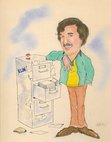David E. Fessenden's Blog, page 2
May 29, 2018
Three Tips for Honest Sentences
English grammar needs to be kept honest. By that I mean that we need to  make sure we say what we mean, what is true and accurate, and not what the grammar can cause us to say if we aren’t paying close attention. I can think of three ways that grammar can trip us up in this way. (I am sure you can think of more, and I certainly welcome your additions to this list!):
make sure we say what we mean, what is true and accurate, and not what the grammar can cause us to say if we aren’t paying close attention. I can think of three ways that grammar can trip us up in this way. (I am sure you can think of more, and I certainly welcome your additions to this list!):
There you have it—three ways you can veer off the path of truth with the wording of your sentences, and how to avoid it. As Christian writers, we should lead the way in upholding the truth. If you have other ideas on potential truth-killers to avoid, please share!
December 11, 2017
Let’s Not Create Urban Legends
 Whenever I edit a Christian book that illustrates a point using “the results of a scientific study,” I cringe! Usually the information comes from another author who confidently quotes an unnamed source—and usually, that source is nowhere to be found, and the material is totally bogus! Make sure that any “research” you cite is true and accurate, and also draws the correct conclusions—and you normally do that by looking up the original research study, if possible. When you don’t go back to the source, an urban legend can be created. Example: it is commonly reported that, according to scientists, the bumblebee is aerodynamically unable to fly. This is sourced from the story of an aerodynamics expert who tried to work out the math on this question, literally on a napkin, at a dinner party. He started by guessing the weight, wingspan, thrust, etc. of a bumblebee, and couldn’t make it work because he had the figures all wrong. When he got back to his workplace and looked up the correct weight, wingspan, etc., it all worked out (and the bumblebees of the world heaved a collective sigh of relief, I’m sure). But other people at the party apparently never got the memo, and spread the rumor that bumblebees are not supposed to be able to fly. So-called “higher criticism” of the Bible falls into this trap. Higher critics claim that the Bible, especially the Old Testament, was compiled over centuries, well into and even after the time of Christ. Much of it is based on the theory of the “J document” and “E document” (theoretical predecessors of the first five books of Moses, one of which speaks of “a god” named Jehovah, and a separate document which speaks of “a god” named Elohim). The argument goes that the Jews had two gods, and only agreed on monotheism later, at which point they merged the two documents, and that’s why in the Old Testament God is call Jehovah in some places and Elohim in others! Then they discovered the Dead Sea Scrolls, dated to before the time of Christ, which contained most of the books of the Old Testament, virtually identical to the ones we have today (the wording is something like 99.5% the same). It proved the faithful transmission of God’s Word through the centuries, and totally discredited the “J document/E document” theory — and yet, liberal scholars still hold to this theory today! My point, however, is not that including undocumented (and/or misinterpreted) research in your book is necessarily going to create an urban legend. But it may end up spreading a falsehood. It could be harmless, as in the bumblebee story, or it may be dangerous, as in the theories of higher criticism. Regardless, is this what a Christian writer should be doing?
Whenever I edit a Christian book that illustrates a point using “the results of a scientific study,” I cringe! Usually the information comes from another author who confidently quotes an unnamed source—and usually, that source is nowhere to be found, and the material is totally bogus! Make sure that any “research” you cite is true and accurate, and also draws the correct conclusions—and you normally do that by looking up the original research study, if possible. When you don’t go back to the source, an urban legend can be created. Example: it is commonly reported that, according to scientists, the bumblebee is aerodynamically unable to fly. This is sourced from the story of an aerodynamics expert who tried to work out the math on this question, literally on a napkin, at a dinner party. He started by guessing the weight, wingspan, thrust, etc. of a bumblebee, and couldn’t make it work because he had the figures all wrong. When he got back to his workplace and looked up the correct weight, wingspan, etc., it all worked out (and the bumblebees of the world heaved a collective sigh of relief, I’m sure). But other people at the party apparently never got the memo, and spread the rumor that bumblebees are not supposed to be able to fly. So-called “higher criticism” of the Bible falls into this trap. Higher critics claim that the Bible, especially the Old Testament, was compiled over centuries, well into and even after the time of Christ. Much of it is based on the theory of the “J document” and “E document” (theoretical predecessors of the first five books of Moses, one of which speaks of “a god” named Jehovah, and a separate document which speaks of “a god” named Elohim). The argument goes that the Jews had two gods, and only agreed on monotheism later, at which point they merged the two documents, and that’s why in the Old Testament God is call Jehovah in some places and Elohim in others! Then they discovered the Dead Sea Scrolls, dated to before the time of Christ, which contained most of the books of the Old Testament, virtually identical to the ones we have today (the wording is something like 99.5% the same). It proved the faithful transmission of God’s Word through the centuries, and totally discredited the “J document/E document” theory — and yet, liberal scholars still hold to this theory today! My point, however, is not that including undocumented (and/or misinterpreted) research in your book is necessarily going to create an urban legend. But it may end up spreading a falsehood. It could be harmless, as in the bumblebee story, or it may be dangerous, as in the theories of higher criticism. Regardless, is this what a Christian writer should be doing?
August 12, 2017
What a laugh!
If you want to get your reader to pay attention to a comment you’ve  written, to remember your point, try humor. It’s often the only way you can get anyone to take you seriously. “Ah,” but you say, “I’m no comedian; I’m at a loss when it comes to making a witty comment.” The cure for that, my friend, is to learn to laugh at yourself. I love to use self-deprecating humor in my writing, because I never run out of material! Perhaps you think that, as a Christian, life is too serious for levity. Are your shorts too tight? Lighten up, for crying out loud. Some of the best humor, especially self-deprecating humor, is a healthy response to pain, frustration, and humiliation—all very serious stuff. And it’s too serious not to see the irony in the situation. Do you know what I did when I realized my sinfulness and need for Christ in my life? Once I surrendered myself to Christ and received His forgiveness, I laughed! (The people I was praying with thought I was a little kooky, I think.) I laughed because I realized what a silly fool I had been, hopelessly trying to make myself “good enough” for God, when all the time He just wanted me to give up and accept His gift of salvation, by faith. Is salvation by faith a serious business? You bet it is—too serious not to laugh at our own attempts to be accepted by God any other way. In Psalm 2, the rulers of the world speak of overthrowing God’s authority and choosing their own way. Serious stuff, right? How does God respond? “He who sits in the heavens laughs” (Psalm 2:4). Somehow how I don’t think they’ve got God very worried. And that’s the point! Get the joke? Stop that grinning—this is serious, remember? Humor can be used to deflect opposition, as well. During a presidential campaign debate, Ronald Reagan was asked, as the oldest President in history, if his age affected his ability to perform in the office. His response? “I will not make age a factor in this campaign. I will not exploit, for political purposes, my opponent’s youth and inexperience.” The audience burst into hysterics. Even his opponent, Walter Mondale, standing at the other podium on the stage, could not help laughing. And the question of Reagan’s age was barely mentioned throughout the rest of the campaign. If you still think you may need a funny bone transplant, read some of the great authors of humor from the present and the past. That may help jump-start your humor machine.
written, to remember your point, try humor. It’s often the only way you can get anyone to take you seriously. “Ah,” but you say, “I’m no comedian; I’m at a loss when it comes to making a witty comment.” The cure for that, my friend, is to learn to laugh at yourself. I love to use self-deprecating humor in my writing, because I never run out of material! Perhaps you think that, as a Christian, life is too serious for levity. Are your shorts too tight? Lighten up, for crying out loud. Some of the best humor, especially self-deprecating humor, is a healthy response to pain, frustration, and humiliation—all very serious stuff. And it’s too serious not to see the irony in the situation. Do you know what I did when I realized my sinfulness and need for Christ in my life? Once I surrendered myself to Christ and received His forgiveness, I laughed! (The people I was praying with thought I was a little kooky, I think.) I laughed because I realized what a silly fool I had been, hopelessly trying to make myself “good enough” for God, when all the time He just wanted me to give up and accept His gift of salvation, by faith. Is salvation by faith a serious business? You bet it is—too serious not to laugh at our own attempts to be accepted by God any other way. In Psalm 2, the rulers of the world speak of overthrowing God’s authority and choosing their own way. Serious stuff, right? How does God respond? “He who sits in the heavens laughs” (Psalm 2:4). Somehow how I don’t think they’ve got God very worried. And that’s the point! Get the joke? Stop that grinning—this is serious, remember? Humor can be used to deflect opposition, as well. During a presidential campaign debate, Ronald Reagan was asked, as the oldest President in history, if his age affected his ability to perform in the office. His response? “I will not make age a factor in this campaign. I will not exploit, for political purposes, my opponent’s youth and inexperience.” The audience burst into hysterics. Even his opponent, Walter Mondale, standing at the other podium on the stage, could not help laughing. And the question of Reagan’s age was barely mentioned throughout the rest of the campaign. If you still think you may need a funny bone transplant, read some of the great authors of humor from the present and the past. That may help jump-start your humor machine.
December 19, 2016
Front Matter Does Matter
 Image by Simon Howden/ freedigitalphotos.net
Image by Simon Howden/ freedigitalphotos.net
Most nonfiction book writers couldn’t care less about the chicken or the egg. When they ask which comes first, they’re probably talking about the foreword, the preface, the acknowledgments, and the introduction. And what’s the difference between them, anyway?
The foreword, preface, acknowledgments, and introduction (along with the dedication and table of contents) are what publishers refer to as “front matter,” and although they are small parts of your book, they can be critical. These preliminary pages of your manuscript should set the pace for the rest of the book, drawing readers in and making them want to read on.
Since these are the first pages an editor looks at, you should make sure you get them right, and make a good first impression. Acquisition editors may not reject a book merely because of a pretentious, silly or maudlin preface, but it can color their view of the rest of the manuscript. Besides, if you demonstrate confusion over what a foreword, preface or introduction is, an editor is likely to wonder what else you may have wrong.
So what’s the difference between all these front parts of a book? Here they are, in the order in which they should appear in your manuscript, following the table of contents:
Foreword: This is a statement by someone other than the author, recommending the book.Preface: This is the author’s own statement about the book — usually, the reasons he or she wrote it.Acknowledgments: This is a place to recognize those who helped the author in some way with the book. The acknowledgments may also include a list of permissions granted for reprinted material. Sometimes the acknowledgments can be included in the preface, or even instead of the preface.Introduction: This is the point at which you begin to introduce the subject of the book, setting the scene, identifying the problem, challenging the reader, etc. This is the real beginning of the text of the book.Now that we understand what the preliminary parts of a book are, let’s look at some of the ways an author can run into trouble — and how to avoid it:
The foreword is an optional item. Unless the person writing it is so well-known that you want to include “With a foreword by So-and-so” on the cover, don’t bother with it — at least, not at the stage of presenting the manuscript to a publisher.A preface has to have some real content to it, or you might as well not include it at all. There is no reason to talk about your childhood and how you always wanted to write, and so on, ad nauseam. If the book is an outgrowth of how God brought you victory in some area of your Christian life, and you can briefly — briefly — tell that story in an engaging way, then by all means, make that your preface. I find it interesting, however, to discover that very few of the better-selling authors have prefaces in their books. They usually just launch into the message of the book.Some authors get the acknowledgments mixed up with the dedication (which should be placed before the table of contents, by the way). A dedication means the book was written in honor of someone, while the acknowledgments are to thank someone for their assistance in putting the book together.I occasionally receive manuscripts which include in the front of the book what the author has labeled a “prologue.” This is really a misnomer. A prologue, according to the dictionary, is an introduction to a poem, a play or other work of literature. I think it can be assumed that the term “prologue” could be used in a novel, for example (I do so in my own novel), but in nonfiction it’s best to stick with the more mundane term, “introduction.” (Better yet, just call your introduction “Chapter 1.”)Why all this concern about “front matter”? Many readers never even glance at the dedication, foreword, preface or acknowledgments, and some of them barely skim the introduction, so why make such a big deal about them? It is because your first reader of your book is the acquisition editor.
The care that you put into these first words can make all the difference as to whether the editor looks at the rest of the manuscript. Remember, first impressions last — so get your front matter right!
December 9, 2016
In Defense of Editors
[image error]In a recent post, I mentioned that many of the clichés in my book were removed by the editor. One of my good friends commented that I should have left those clichés in, despite what my editor said. “Your clichés are uniquely you,” she said.
That was meant as a compliment, but . . . well . . . My friend was not the only one to suggest that clichés are my “style” and should be kept in. But the editor is your first audience, and if you trust your editor, you have to accept that the editor sees blemishes in your writing that you are blind to. And in the interest of full disclosure (it really hurts to admit this), I have to say that the number of clichés in my manuscript was really over the top! (The ironic use of the cliché “over the top” in that last sentence was NOT deliberate; I only just now noticed it!)
Another friend made the point that a few clichés are inevitable, because you can’t make every sentence into a brilliant and original turn of a phrase, or it would be hard to read. I agree. It would be hard to write as well!
Brilliant originality in every sentence? I don’t want to put any author under that kind of pressure! However, if a phrase is so “original” it is hard to read, then it’s probably badly written! If it’s a really good original thought, then it should be quite easy to read. To give one example of an author who uses one original phrase after another, let me suggest A.W. Tozer. His writing is not hard to read, in the sense of being hard to figure out what he’s saying.
His writing tends to be slow reading, because what he says is so profound it causes the reader to pause and think about it. Hard to skim? Yes. Hard to read? Never! This is why Tozer is so often quoted. So don’t feel sorry for me because I was asked to change a few clichés. It gave me a chance to get a little creative. And I wouldn’t have seen them because I was blind to the mistakes. (Besides, she let me keep a few of my favorite clichés!) It’s always good to have another pair of eyes to look at your manuscript. My editor even found a few sentences in my manuscript (a manuscript I had gone over and over) that didn’t make sense to her. I looked at those sentences and said “Wow, how did I miss that?” And I wrote something much better.
So give your editor a fair chance. He or she is committed to making you look good!



